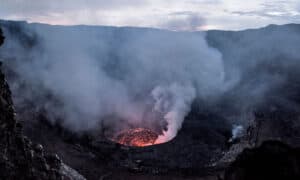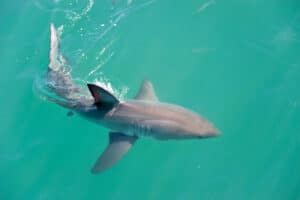With a name like “killer whales,” it’s no wonder that these creatures are adept at ending the lives of other creatures. Killer whales, otherwise known as orcas, are the ocean’s apex predators. These intelligent pack hunters can take down the sea’s largest creatures, from whales to sharks and dolphins. Strangely, orcas have been recorded doing some strange things with their kills recently: only eating the organs! Today, we are going to discover if (and how) killer whales are eating just the livers out of great white sharks. Let’s get started!
Do killer whales hunt sharks?
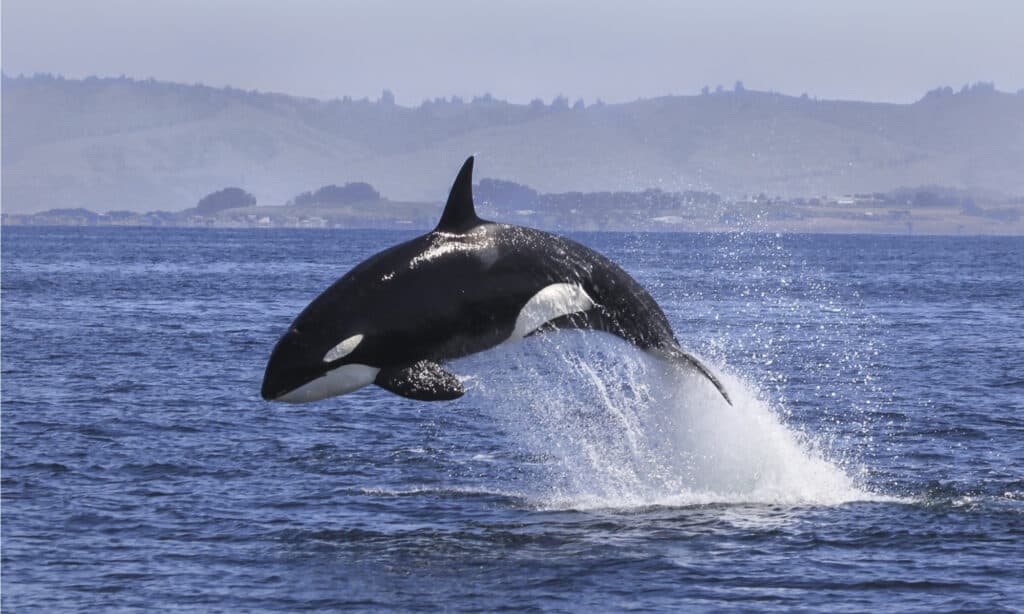
Orcas are known to hunt great white
sharks
and only eat their livers.
©Tory Kallman/Shutterstock.com
Yes, killer whales hunt sharks and whales much larger than they are when acting as a pack.
Killer whales are some of the top predators in the ocean. They live in nearly every body of water, tropical and cold, and can hunt almost anything they desire. Although orcas are large, their ability to kill prey larger than the individual orca comes from their adept skill at pack hunting. It wouldn’t be a stretch to consider killer whales the “wolf packs” of the ocean, able to take down massive beasts with the help of numbers and strategy.
When with a pack, orcas are able to take down whales and sharks, the largest creatures in the ocean. In fact, sharks are a regular part of some orca pods (the technical name for a pack of orcas) diets. The largest predatory shark in the world, the great white shark, is just a tasty meal for a pack of hungry orcas.
What makes the dietary preferences of orcas so interesting, however, is that they have started targeting only one organ of great white sharks!
Is it normal for killer whales to hunt sharks?
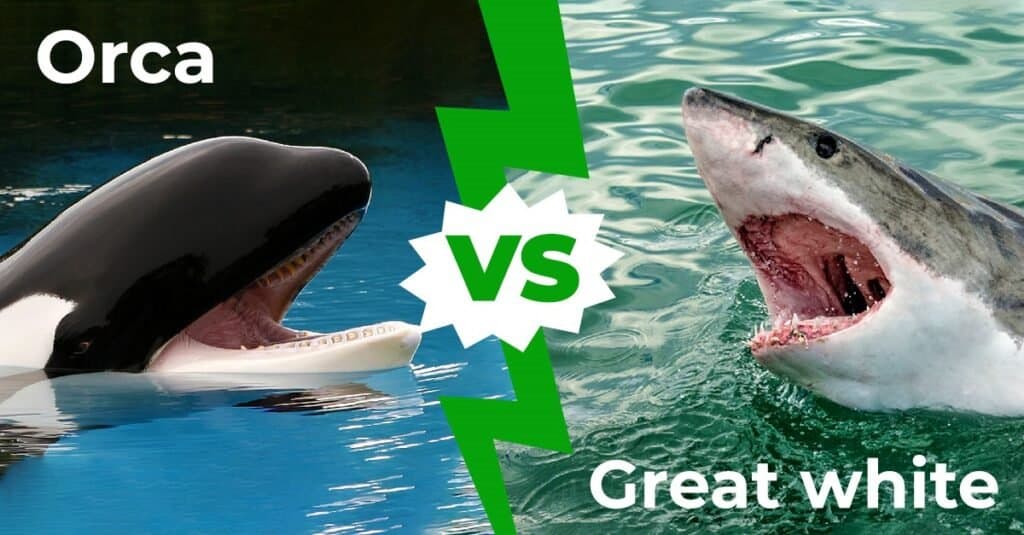
For as long as orcas have been around, they have hunted sharks and whales. Generally, a shark isn’t going to be a real threat to a full-grown orca, even a great white. As such, the only reason that orcas hunt sharks is to eat them.
What makes things interesting is that many of the great white sharks that orcas are killing are totally intact. Well, almost totally. Orcas seem to be targeting just the livers of these massive sharks and leaving the rest of the body to rot in the ocean. The question remains: why?
What Do They Normally Eat?
Killer whales are apex predators and opportunistic feeders, meaning they will eat whatever prey is available in their environment. The diet of a killer whale can vary widely depending on its location but typically consists of fish such as herring, salmon, and mackerel. They also eat squid, octopus, sea birds, and even seals and sea lions.
Occasionally they may also consume larger animals like sharks or even other whales. On average, an adult killer whale consumes around 500 lbs of food per day! They usually hunt together in groups to increase their chances of success when targeting large prey items. This type of cooperative hunting has been observed all over the world and shows how intelligent these creatures truly are.
Why do killer whales eat shark livers?
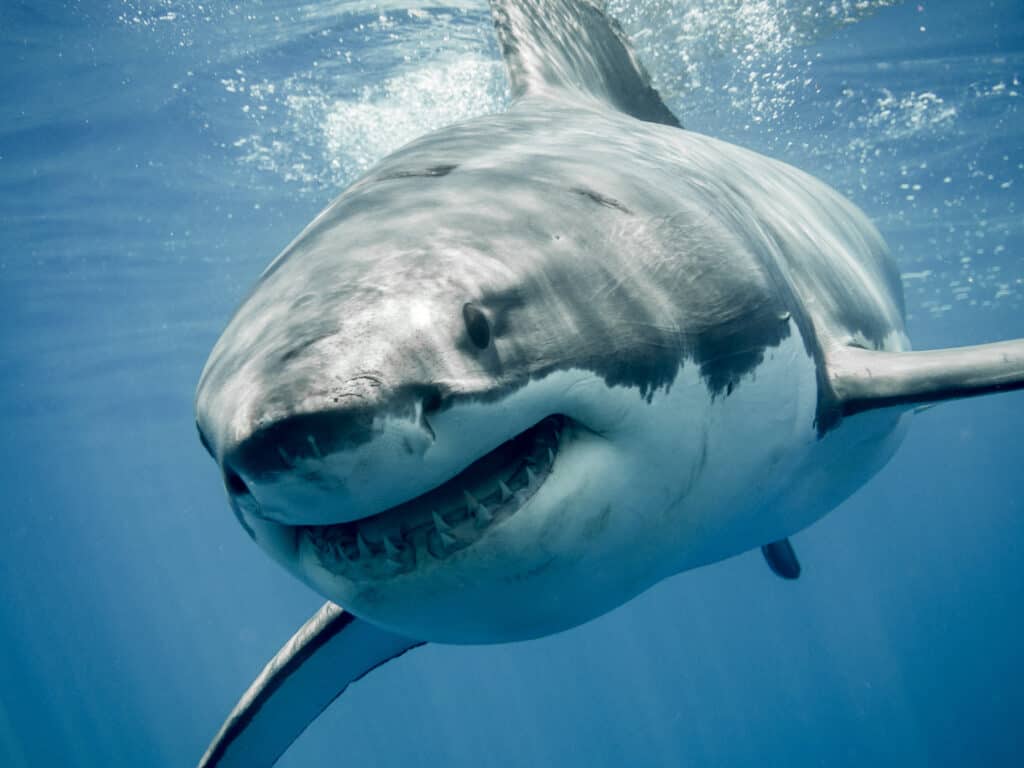
Shark livers are rich in vital nutrients and fats, perfect for a hungry orca.
©Ramon Carretero/Shutterstock.com
As crazy as it sounds, orcas aren’t acting all that differently than humans do. The primary reason that orcas are eating only the livers of great white sharks is because of the nutrient properties that the livers have. In the same way that a human will take a supplement when they are low in a certain vitamin in order to stay healthy, orcas will eat the livers of great whites because it is a “superfood” full of essential vitamins that an orca needs.
The primary thing that orcas are targeting when eating shark livers is a compound known as squalene. Squalene is an organic compound that all creatures make; only sharks concentrate its production within their livers. In fact, the name squalene comes from the genus of sharks, Squalus. Historically, squalene was obtained by humans from sharks themselves. It seems that orcas have picked up on our tricks!
How do killer whales get shark livers?
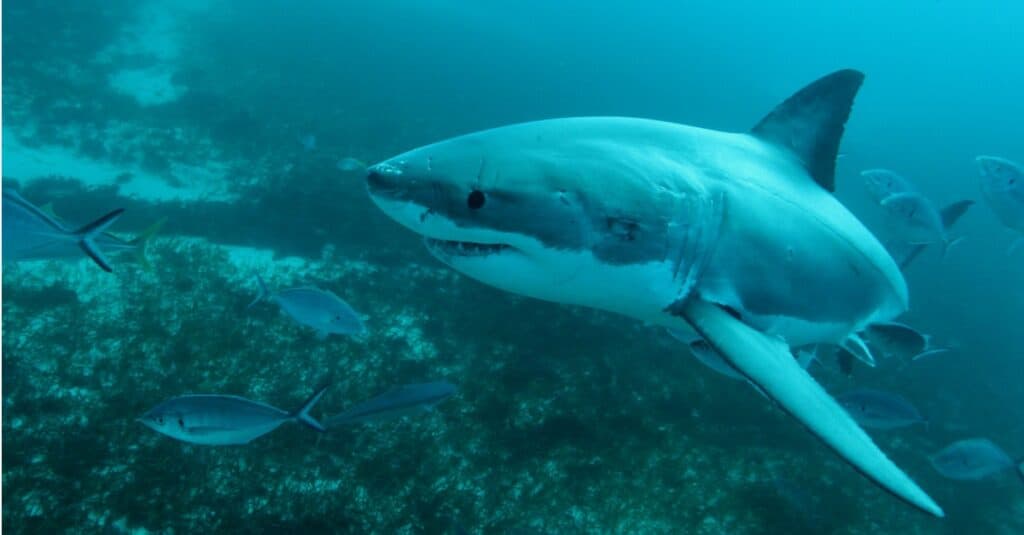
Orcas will flip sharks over, paralyzing them, in order to surgically remove their livers.
©iStock.com/Alessandro De Maddalena
Although orcas are incredible predators, they aren’t dumb animals. Even though they are significantly larger than most of the things they eat, they are still careful when hunting in order to reduce the potential of a life-threatening injury.
When hunting great white sharks, it’s worth it to be careful! As a result, orcas have developed special hunting methods that make it almost child-play to eat shark livers.
When an orca pod spots a shark, it will often surround it, stopping it from swimming away. Then, with a simple and quick motion, they will spin the shark around to where it is belly up. If you watch Shark Week, you know what happens when a shark goes belly up! Once belly up, sharks go into a deep sleep known as tonic immobility. They are essentially paralyzed for at least a minute, plenty of time for an orca to secure a tasty liver.
Once the shark is immobilized, the orcas will surgically bite the shark and nudge it, causing the liver to literally squeeze out. Bon Appétit!
Do killer whales prefer any other organs?
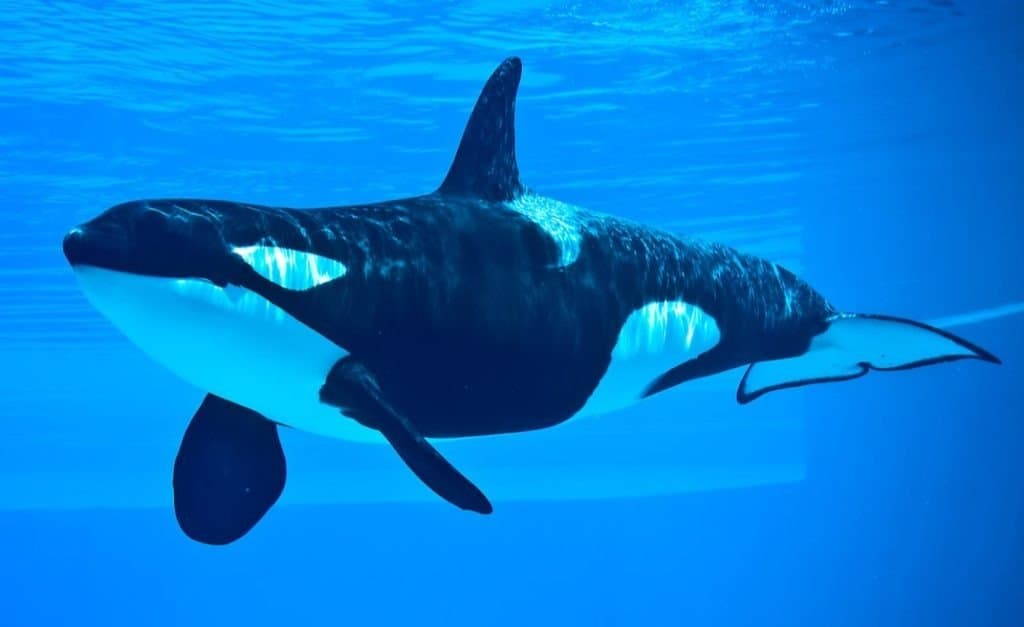
Orcas seem to be targeting shark livers and hearts, as well as whale tongues.
©Miles Away Photography/Shutterstock.com
Although shark livers are especially tasty for orcas, they seem to have widened their palate. In South Africa, orcas have also started targeting the hearts and testes of great white sharks. Both organs have their own nutrient properties (or may just taste good), leading the orcas to specifically target them.
Additionally, orcas in other parts of the world will strategically target whale tongues. Just like a human prefers certain cuts from a cow (steaks), orcas seem to have preferred cuts from a whale. The soft, tender portions of the tongue and lower jaw seem to be the “perfect cut” for a hungry orca.
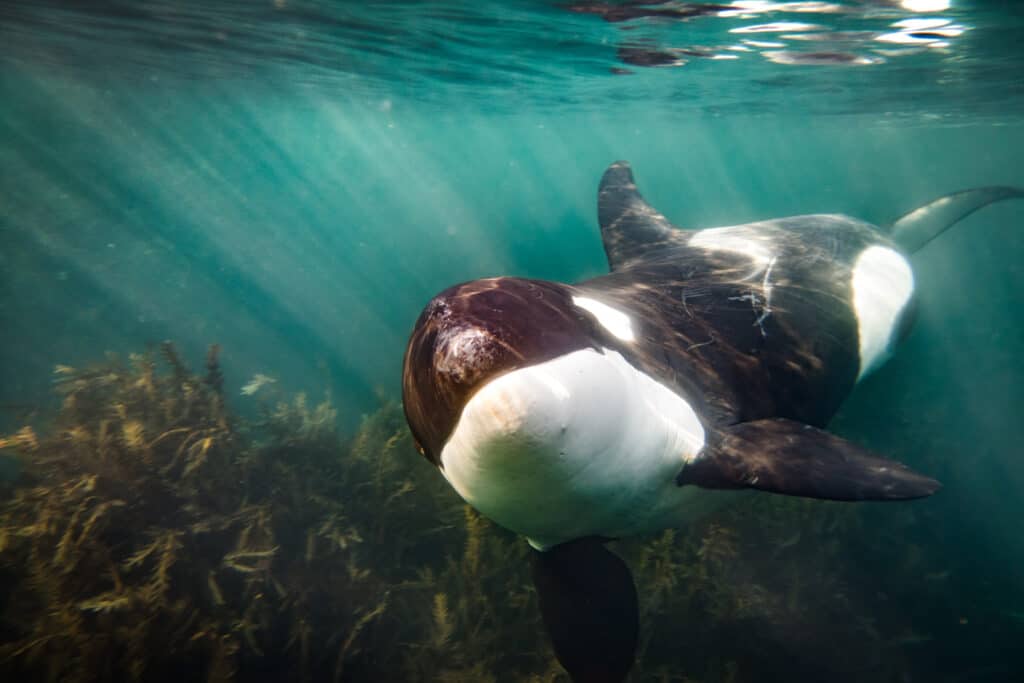
Orcas are so intelligent that they can pick behaviors up from traveling pods and adapt them to their lifestyle.
©Nick Grobler/Shutterstock.com
How do orcas learn to target certain organs?
There are two notable things that could lead to the preferential targeting of organs. First is the clear benefit to the orcas. Eating a diet rich in shark liver probably tastes great and makes the orcas healthier. If you notice that you feel better when you eat more shark livers, you are probably going to eat more shark livers! Animals and humans also have a biological craving for certain vitamins and minerals. Just as you might crave salt or the potassium in a banana after sweating a lot, an orca craves the nutrients that it can only find in a shark’s liver.
Additionally, orcas seem to be spreading their knowledge around the globe as they travel. Orcas learn from their mothers and other whales in the pod. The adults are also very intelligent and learn new behaviors from interactions with other pods. With how intelligent orcas are, it’s no wonder they can pick behaviors up from traveling pods and adapt them to their lifestyle.
Are Orcas Friendly to Humans?
Due to their high intelligence and sociable disposition, orca whales are not prone to aggressive or hostile behavior towards humans. In fact, there have been numerous documented cases of orca whales coming to the rescue of humans in danger, for example, a group of orca whales assisting a diver in escaping from a shark attack.
Additionally, when orca whales encounter humans in the ocean, their natural curiosity leads them to engage in interactions. Similar to dolphins’ fondness for riding the bow wave of ships, orcas also enjoy surfing the wake of large boats.
Furthermore, orcas are similar to dolphins and harbor a strong aversion to sharks and will attack them if given the opportunity.
The photo featured at the top of this post is © NNER/Shutterstock.com
Thank you for reading! Have some feedback for us? Contact the AZ Animals editorial team.




